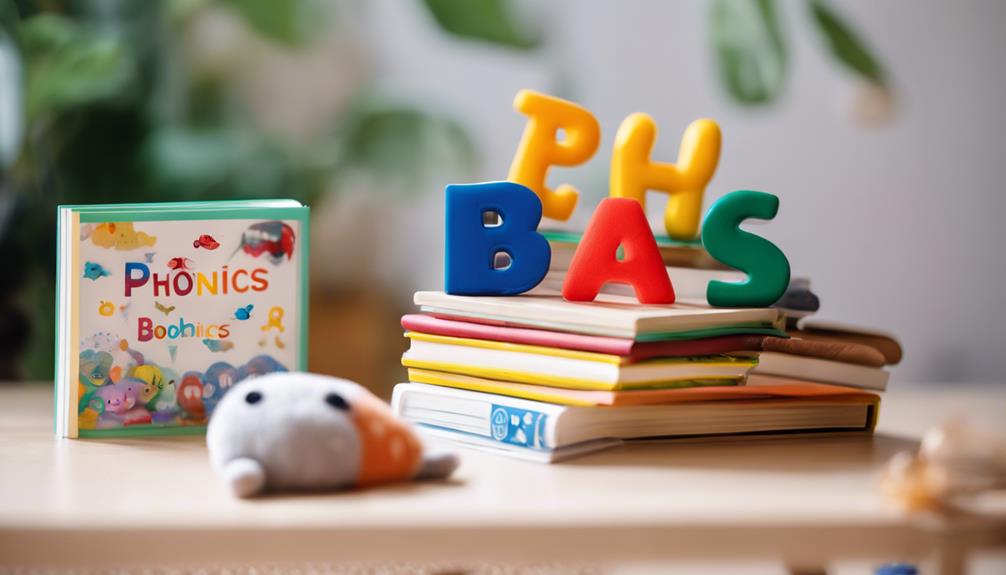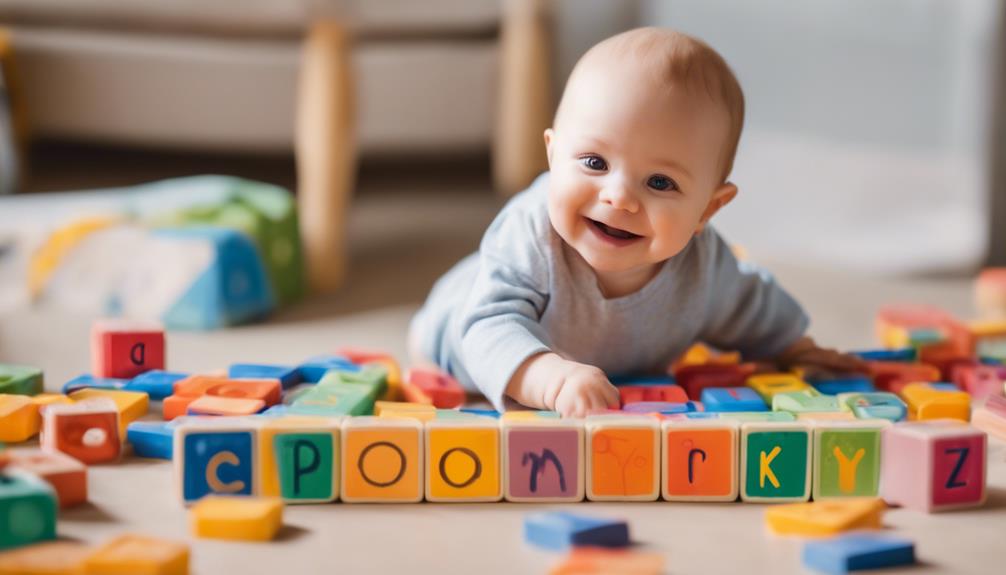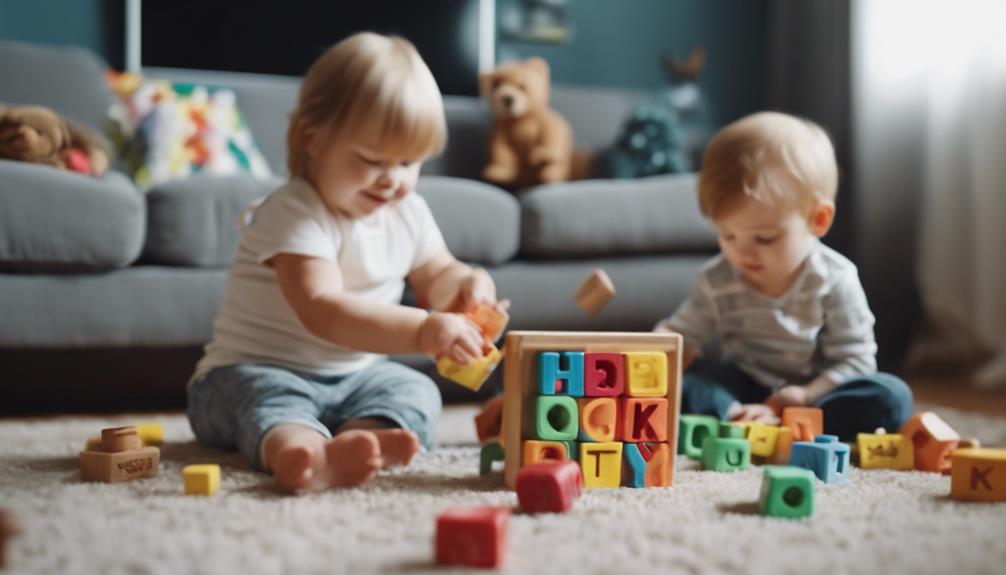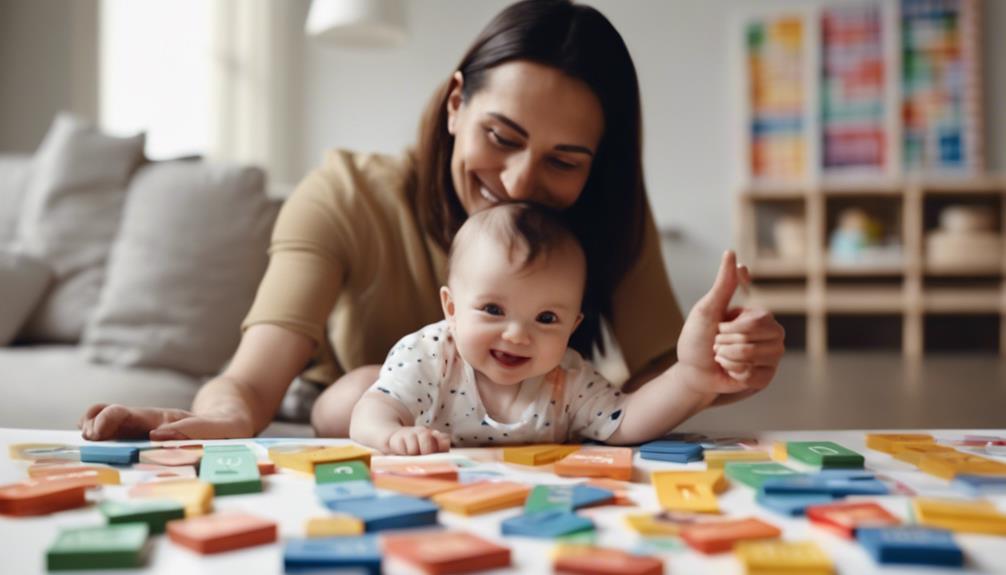To kick off your child’s phonics journey, start a daily routine with **alphabet books**, flashcards, and **interactive toys**. These vibrant and hands-on materials boost learning. Add in music, rhymes, and easy board books for a fun time. Play games like **Phonics Bingo** and Letter Sound Scavenger Hunt. Utilize props and alphabet puzzles for lively storytelling. Track progress by watching **sound blending** and spelling accuracy. Celebrate achievements to inspire development. For additional advice on fun phonics activities and improving literacy skills, keep digging deeper. Why stop now when there’s a world of phonics fun waiting for you?
Key Takeaways
- Start with alphabet books, flashcards, and interactive toys.
- Include colorful materials for sensory stimulation and learning.
- Establish a daily routine with interactive resources.
- Incorporate music, rhymes, and phonics-based stories.
- Use online tools and apps for supplemental learning.
Importance of Baby Phonics
Discover the importance of baby phonics in laying the foundation for early reading skills and language development.
When it comes to your child learning to read, introducing them to letter sounds through phonics can have a profound impact on their language abilities.
By teaching your child the connection between letters and their sounds early on, you're setting the stage for a solid literacy base.
This early exposure to phonics can enhance their auditory discrimination and speech recognition, leading to improved vocabulary acquisition and comprehension skills in infants.
Moreover, engaging your baby in phonics activities not only supports their pre-literacy skills but also fosters a love for reading from a young age.
Through these activities, you can strengthen your bond with your child while stimulating their cognitive growth.
So, don't underestimate the power of baby phonics in shaping your little one's language development and future reading abilities.
Start incorporating phonics into your daily routine to give your child a head start in their literacy journey.
Essential Phonics Materials

To successfully introduce baby phonics, make sure you have essential materials like alphabet books, flashcards, and interactive phonics toys on hand.
Engage your child in learning by providing colorful and tactile materials that stimulate their senses while exploring the sounds of language. Simple board books with clear pictures and letters are excellent for introducing phonics to babies, helping them associate symbols with sounds from an early age.
Incorporating music and rhymes into phonics materials can make the learning process fun and engaging for your little one. Interactive phonics toys that produce sounds or respond to touch can also capture your child's interest and facilitate their learning journey.
Additionally, consider using interactive apps and online resources as helpful tools to supplement your baby's phonics education. By utilizing these essential phonics materials, you can create a rich learning environment that supports your child's early language development.
Creating a Phonics Routine
Introduce consistency by establishing a daily phonics routine that incorporates various engaging resources and activities for your baby. Utilize books, games, online tools, rhymes, songs, and phonics-based stories to make learning fun and memorable. To help you get started, here is a table outlining some activities to include in your phonics routine:
| Phonics Activity | Description |
|---|---|
| Reading Skills Development | Read aloud to your baby daily to enhance their reading skills. |
| Interactive Phonics Games | Play games that require your baby to identify letters and sounds. |
| Phonics Storytime | Share phonics-based stories to make learning enjoyable. |
| Sing-Along Rhymes | Sing songs that focus on letter sounds and phonics rules. |
| Online Phonics Resources | Use interactive online tools to reinforce phonics concepts. |
Benefits of Early Phonics Learning

Early phonics learning offers significant advantages in improving a child's reading and writing skills, establishing a robust foundation for literacy development. When children engage in phonics at an early age, they benefit in the following ways:
- Enhanced Reading Skills: Early exposure to phonics can lead to improved reading abilities, as children learn to decode words more effectively.
- Improved Writing Skills: Phonics instruction helps children understand the relationship between sounds and letters, enhancing their spelling and writing proficiency.
- Language Development: Starting phonics early can enrich vocabulary, promote better communication skills, and boost overall language development.
Research indicates that children who receive phonics instruction from a young age tend to have better spelling capabilities, higher reading comprehension levels, and even show improved academic performance as they progress through school.
Fun and Interactive Phonics Activities
Get ready to have some fun with phonics!
Engage your baby in interactive games and catchy songs to introduce them to the world of letters and sounds.
These activities will make learning phonics enjoyable and interactive for your little one.
Games for Phonics
Explore engaging phonics games that make learning fun and interactive for babies, such as 'Phonics Bingo' and 'Letter Sound Scavenger Hunt'. These games help babies understand how letters make sounds in spoken words, laying a strong foundation to teach reading.
Here are some exciting games to try with your little one:
- Phonics Bingo: Play a game where your baby matches letter sounds to corresponding pictures on a bingo card. This activity reinforces letter-sound associations in a playful way.
- Letter Sound Scavenger Hunt: Hide different objects around the house that start with specific letter sounds. Encourage your baby to find the items while practicing identifying sounds.
- Alphabet Freeze Dance: Play music and have your baby dance around. When the music stops, call out a letter, and your baby has to freeze and say a word that starts with that letter. This game combines movement and phonics learning for an interactive experience.
Engaging in these games will make phonics learning enjoyable and effective for your baby.
Songs for Phonics
Engage your baby in fun and interactive phonics activities by incorporating songs that help reinforce letter sounds and phonics rules in an enjoyable way.
Nursery rhymes and phonics songs are fantastic tools for helping your little one in learning to read. These songs often come with catchy tunes and repetitive lyrics that aid in memory retention.
Interactive phonics songs take learning to the next level by adding actions and visuals that make the learning process more engaging for your child.
By singing phonics songs regularly, you can help your baby internalize letter sounds and enhance their reading readiness. Luckily, there are numerous phonics songs available online for free, providing a convenient resource for parents and educators alike.
Through the repetition and fun of phonics songs, your baby can have a blast while developing essential pre-reading skills that will set a strong foundation for their literacy journey.
Incorporating Phonics Into Playtime

During playtime, you can engage your little one in playful learning activities that incorporate phonics. Use alphabet toys, games, and puzzles to introduce letter recognition and sounds in a fun way.
Incorporate rhyming games, songs, and storytelling sessions to enhance phonological awareness and make learning enjoyable for your child.
Playful Learning Activities
Integrate phonics seamlessly into playtime by incorporating fun and interactive activities that enhance your child's literacy skills. Here are some playful learning activities to help your child with reading and spelling, develop phonological awareness, and enhance their phonics learning:
- Play Rhyming Games: Engage in rhyming activities during playtime to help your child recognize similar sounds in words and improve their phonological awareness.
- Alphabet Toys and Puzzles: Use alphabet toys or puzzles to introduce letter sounds in an entertaining way, making playtime educational and engaging.
- Treasure Hunts: Organize treasure hunts where your child finds objects that start with specific sounds. This activity reinforces phonics learning by associating sounds with corresponding letters.
Phonics Through Games
Make phonics learning interactive and enjoyable for babies by incorporating games into playtime. Reading, matching letters, and playing games are effective ways to introduce phonics to your little one. Below is a table outlining some fun and educational games you can play with your baby to enhance their phonics skills:
| Game | Description |
|---|---|
| "I Spy" | Say, "I spy with my little eye, something that starts with the letter…" and have your baby guess the object. |
| Letter Matching | Match letters to objects around the house or in picture books to help your baby associate sounds with letters. |
| Scavenger Hunts | Create scavenger hunts for specific letters or sounds, encouraging your baby to find and identify them. |
| Singing Alphabet Songs | Sing alphabet songs or rhymes while playing to reinforce letter sounds in a fun and playful way. |
Interactive Reading Sessions
To enhance your baby's phonics skills during playtime, consider incorporating interactive reading sessions that make learning engaging and fun. Here are some ways you can create a stimulating environment for your little one:
- Reading Sessions: Set aside dedicated time for reading together. Use colorful picture books and emphasize letter sounds as you go through the story.
- Phonics-Based Apps: Explore interactive phonics apps designed for young learners. These apps can make learning letter sounds and word recognition enjoyable.
- Interactive Games: Incorporate games that involve identifying letter sounds or matching words to images. Make it a fun and interactive experience for your baby.
Monitoring Phonics Progress
To effectively monitor phonics progress, focus on observing the ability to blend sounds and read words fluently. Keep an eye out for improvements in recognizing letter sounds, decoding new words, and spelling accuracy.
Assess progress through reading assessments, teacher feedback, and observation of reading behaviors. By tracking these aspects, you can identify mastered skills, pinpoint areas that need improvement, and determine the most effective strategies.
Remember to celebrate milestones and progress to motivate continued growth in phonics skills. By monitoring progress in blending sounds and reading fluently, you can tailor your teaching approach to meet the specific needs of your young learner.
Regularly reviewing and adjusting your monitoring methods will guarantee that your child is on the right path to phonics success. Stay engaged and proactive in tracking progress to support their development effectively.
Frequently Asked Questions
How Do I Teach My Baby Phonics?
To teach your baby phonics, start with nursery rhymes and simple songs. Use picture books with sounds, play interactive games, and repeat sounds often. Encourage verbal communication to enhance listening skills. Phonics can be fun!
When to Start Teaching Baby Phonics?
Start teaching baby phonics as early as 2-4 months to pave the way for language skills. Begin with simple sounds like 'ah' and 'oo,' gradually advancing to more complex phonemes. Use interactive methods for an enjoyable learning experience.
How Do You Teach Phonics for the First Time?
When you teach phonics for the first time, start with basic letter sounds and interactive activities. Engage learners with songs and games. Practice blending sounds with simple words. Read phonics-based books daily to reinforce skills.
What Age Should Phonics Be Taught?
Phonics should be taught starting around ages 2-4 when children recognize letters and sounds. Introduce phonics through play, books, and videos to help build a strong foundation for reading and language skills early on.
Conclusion
To sum up, studies have shown that children who learn phonics early on have a significant advantage in reading and language development. By starting your baby on a phonics routine and incorporating fun activities, you're setting them up for success in their future education.
Remember, phonics isn't only beneficial but also enjoyable for both you and your little one. So grab some phonics materials and get started on this important learning journey together!










